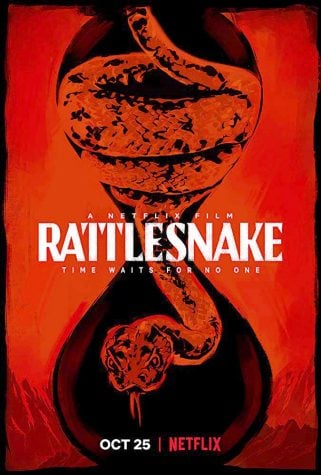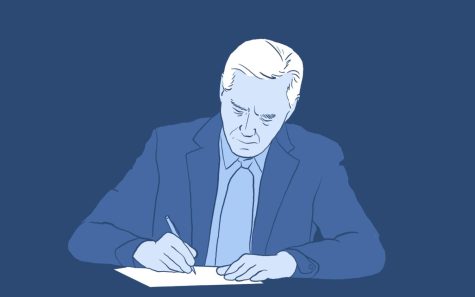Nation & World Briefs: December 13
Turkey train crash leaves 7 dead, dozens injured
A high-speed train hit a railway engine and crashed into a pedestrian overpass at a station in the Turkish capital Ankara on Thursday, killing seven people and injuring 46 others, officials and news re said.
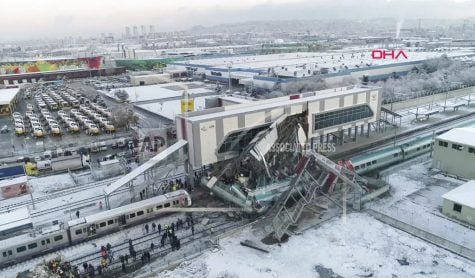
This image made from video shows the aftermath of a high-speed train crash at a station in Ankara, Turkey, Thursday, Dec. 13, 2018. The train hit a railway engine and crashed into a pedestrian overpass at the station on Thursday. (DHA via AP)
The 6:30 a.m. (0330 GMT) train from Ankara to the central Turkish city of Konya collided with the engine, which was checking the tracks at the capital’s small Marsandiz station, Ankara Gov. Vasip Sahin told reporters at the scene. The high-speed train transits that station without stopping.
Sahin initially said four people were killed in the crash. His office later issued a statement saying seven people were killed in the crash, including the high-speed train’s engine driver. Three of the injured passengers were in serious condition.
“Our hope is that there are no other victims,” he said.
Senate to vote on aid to Yemen in wake of Khashoggi slaying
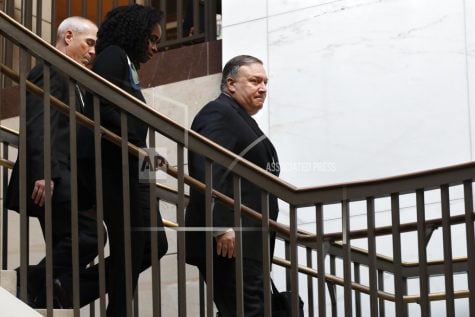
FILE – In this Nov. 28, 2018, file photo, Secretary of State Mike Pompeo, right, arrives for a closed-door meeting with Senators about Saudi Arabia on Capitol Hill in Washington. Senators are expected to vote on a resolution that would call on the U.S. to pull assistance from the Saudi-led war in Yemen, a measure that would rebuke Saudi Arabia after the killing of journalist Jamal Khashoggi. (AP Photo/Jacquelyn Martin, File)
Senators are expected to vote Thursday on a resolution that would call on the U.S. to pull assistance from the Saudi-led war in Yemen, a measure that would rebuke Saudi Arabia after the killing of journalist Jamal Khashoggi.
The Senate may also consider a separate resolution condemning the journalist’s killing as senators have wrestled with how to respond to the Saudi journalist’s murder. U.S. intelligence officials have concluded that Saudi Crown Prince Mohammed bin Salman must have at least known of the plot, but President Donald Trump has been reluctant to pin the blame.
Senators voted 60-39 on Wednesday to open debate on the Yemen resolution, signaling there is enough support to win the 50 votes needed. But it’s unclear how amendments to the measure could affect the final vote, which is expected to come Thursday.
While enough Republicans support the resolution, which was sponsored by Republican Sen. Mike Lee of Utah and Independent Sen. Bernie Sanders of Vermont, Majority Leader Mitch McConnell and most other Republicans oppose it.
“I think every single member of this body shares grave concerns about the murder of Khashoggi and wants accountability,” McConnell, R-Ky., said on the Senate floor Wednesday morning. “We also want to preserve a 70-year partnership between the United States and Saudi Arabia, and we want to ensure it continues to serve American interests and stabilizes a dangerous and critical region.”
Senate Foreign Relations Committee Chairman Bob Corker, a Republican from Tennessee, is preparing the separate, alternate resolution condemning the journalist’s killing. McConnell urged senators to vote for Corker’s measure, which he said: “does a good job capturing bipartisan concerns about both the war in Yemen and the behavior of our Saudi partners more broadly.” Corker has not released the full text of that resolution.
It appears unlikely that the House would be willing to consider either measure. House leaders added a provision to an unrelated House rule that would make it harder for lawmakers there to call up a Yemen resolution if the Senate passes it. The rule barely passed, 206-203, after Democrats railed against the Yemen provision.
Khashoggi, who had lived in the U.S. and wrote for The Washington Post, had been critical of the Saudi regime. He was killed in what U.S. officials have described as an elaborate plot as he visited the consulate in Istanbul for marriage paperwork.
Pressed on a response to the slaying, Trump has been reluctant to condemn the crown prince. He said the United States “intends to remain a steadfast partner” of the country, touted Saudi arms deals worth billions of dollars to the U.S. and thanked the country for plunging oil prices.
Whatever is passed this month, lawmakers in both chambers have signaled that they will continue to press Saudi Arabia next year.
House Democrats are also expected to keep the issue alive when they take the majority in January. The top Democrat on the House intelligence committee, California Rep. Adam Schiff, said he intends to lead a “deep dive” into Saudi Arabia and Yemen. Democratic Rep. Eliot Engel of New York, the likely incoming chairman of the House Foreign Affairs Committee, said he would hold hearings on Saudi Arabia early next year.
Missing Canadians raise stakes in China-US-Canada dispute
The apparent detentions of two Canadian men in China this week have raised the stakes in a three-way international dispute with the United States.
The Canadian government confirmed reports late Wednesday that Michael Spavor, a China-based entrepreneur who organizes tours to North Korea, had gone missing. His disappearance follows the detention of former Canadian diplomat Michael Kovrig in Beijing on Monday.
The two cases ratchet up pressure on Canada, which is holding a Chinese telecommunications executive wanted by the United States. The U.S. is seeking the extradition of Meng Wanzhou, the chief financial officer of Huawei Technologies, who was arrested in Vancouver on Dec. 1.
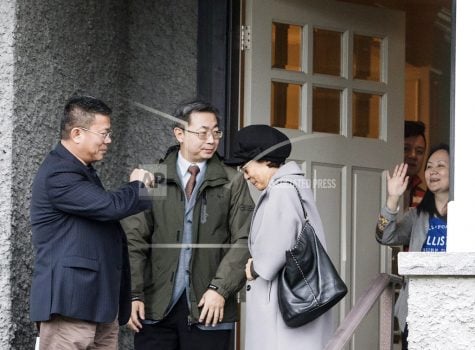
Huawei chief financial officer Meng Wanzhou, right, waves goodbye to visitors at her home in Vancouver on Wednesday, Dec. 12, 2018. A Canadian court on Tuesday released Meng on bail, confining her to Vancouver and its suburbs while she awaits possible extradition to the United States. The U.S. has accused Huawei, the biggest global supplier of network gear for phone and internet companies, of using a shell company to do business with Iran in violation of U.S. sanctions. (Jonathan Hayward/The Canadian Press via AP)
Canadian officials have not been able to contact Spavor “since he let us know he was being questioned by Chinese authorities,” Canadian Global Affairs spokesman Guillaume Bérubé said. “We are working very hard to ascertain his whereabouts and we continue to raise this with the Chinese government.”
The Chinese government has not commented on Spavor’s disappearance. A Foreign Ministry spokesman said Tuesday that he had no information on Kovrig’s detention, which was reported by his employer, the International Crisis Group think tank.
Regional newspapers in Beijing and Liaoning province, where Spavor lives, reported separately that the two are under investigation on suspicion of “committing acts endangering the national security of China.” Authorities could not be reached to confirm those reports.
The broadly defined charge encompasses both traditional espionage and other forms of information gathering such as interviewing political dissidents and contacting non-governmental organizations.
Another Canadian, Keven Garratt, spent 750 days in detention in 2014-16 and was given an eight-year prison sentence for espionage before being deported. Garratt’s detention was seen as a tit-for-tat response to Canada’s arrest of a Chinese spy who was eventually extradited to the U.S.
Spavor is a fluent Korean speaker with longstanding ties to North Korea through his company, Paektu Cultural Exchange. He was instrumental in bringing NBA player Dennis Rodman to Pyongyang in 2013 and has organized a number of tours and joint cultural projects with the North since then.
Acquaintances said he was due in Seoul, the South Korean capital, on Monday, but never showed up.
At the root of the dispute is Canada’s arrest of Meng while on a layover at Vancouver airport. The U.S. accuses Huawei of using a Hong Kong shell company to do business with Iran in violation of U.S. sanctions.
The editor in chief of the Global Times, a Communist Party-run tabloid known for its provocative views, warned in a video Wednesday night of “retaliatory measures” if Canada doesn’t free Meng.
“If Canada extradites Meng to the US, China’s revenge will be far worse than detaining a Canadian,” Hu Xijin said, speaking in English.
Canada has asked China for extra security at its embassy because of protests and anti-Canadian sentiment and has advised foreign service staff to take precautions, a senior Canadian official told reporters.
The United States and China have taken pains to emphasize that ongoing trade talks are separate from the U.S. case against Meng. But with a few words, President Donald Trump obliterated the distinction Tuesday, saying he’d wade into the case if it would help produce a trade agreement with China.
“If I think it’s good for what will be certainly the largest trade deal ever made — which is a very important thing — what’s good for national security — I would certainly intervene if I thought it was necessary,” Trump told Reuters in an interview.
The comment suggests Meng could be a political pawn in negotiations and makes things more awkward for Canada. Canadian Prime Minister Justin Trudeau bristled at Trump’s assertion, saying: “Regardless of what goes on in other countries, Canada is, and will always remain, a country of the rule of law.”
Foreign Minister Chrystia Freeland said it was “quite obvious” any foreign country requesting extradition should ensure “the process is not politicized.”
Chinese Foreign Ministry spokesman Lu Kang said Wednesday, “For anyone who wants to contribute to settling the problem in a positive direction, we certainly welcome their efforts.”
“Both Canadian and American officials have emphasized that the Meng arrest is separate from the trade talks,” said Gregory Yaeger, special counsel at the Stroock law firm and a former Justice Department trial attorney.
“Trump’s remarks could be interpreted as creating the appearance that the arrest also had political motivations. This could undermine the US’s reputation as a country that follows the ‘rule of law,’ and could ultimately undermine both the Meng prosecution and the trade talks.”
There is a precedent for Trump intervening on behalf of a Chinese company accused of violating U.S. sanctions.
Trump drew fire from Capitol Hill in June when he reached a deal that spared another Chinese telecommunications company, ZTE, from U.S. sanctions that probably would have put it out of business after it was accused of selling equipment to Iran and North Korea. U.S. regulators planned to bar it from receiving U.S. components that it depended on, effectively a corporate death sentence.
But Trump issued a reprieve, perhaps partly because U.S. tech companies, major suppliers to ZTE, would also have been scorched. ZTE agreed to pay a $1 billion fine, change its board and management, and let American regulators monitor its operations.
As of 1:43 AM on December 13th, China confirms detentions of 2 Canadian men on suspicion of ‘endangering national security’ .



